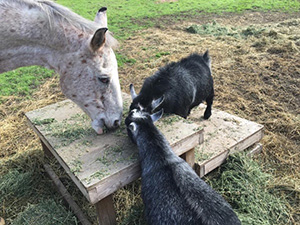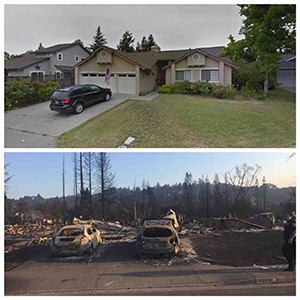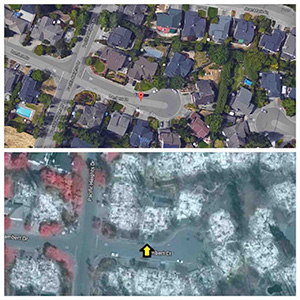 Nicole's horse, Mert, and two of the Hardesty's goats.
Nicole's horse, Mert, and two of the Hardesty's goats.Telling her harrowing story of a narrow wildfire escape does not make Michelle Hardesty emotional. She rattled off the play-by-play like a fully caffeinated sports radio announcer. But her voice started to slow and shake when she paused at the end. A few days after a frightfully close call, she took a breath – a still-smoky breath that hurt her throat a little – and saw that her family was around her, doing fine, despite that they lost almost all their possessions on the night of October 8-9. Their northern Santa Rosa neighborhood was one of many in the North Bay ravaged by a vicious firestorm.
"I’ve never been a victim like this before,” she said on October 13 in an emotional voice that grew higher and higher. "It's really hard. People are offering so much to us, but I don’t want to take it. The connection in my brain is that if someone gives you something, you’ve either earned it or you’ve paid for it. Accepting something out of generosity makes me want to cry."
Then she laughs. “Plus, we don’t have anywhere to put anything.”
Michelle is a County of Marin employee, an assistant retirement administrator with the Marin County Employees’ Retirement Association (MCERA). She’s been with the County since 2011. Now, she’s one of the County employees who is building a new life after losing everything that was inside her rented home off Mark West Springs Road. At least eight County employees suffered similar losses.
Michelle shared the home with her husband of 42 years, Terry, their 37-year-old daughter Nicole, and Nicole’s sons Michael and Kyle. All they had left right after the fire were two trucks, a fifth-wheel trailer, and their five pygmy goats that were rescued from a burned-out barn.
On October 13 Michelle said she planned to be at work by Monday, October 16 – unless that became the day that law enforcement officials would allow her family to visit the charred wreckage of their home to see if they could find any mementos that remain.
“We’re just counting blessings, pretty much every second, every minute,” Michelle said while her family did some shopping at a big-box store. “We all got out alive. We had to drive through flames, but we made it out alive.”
It was just after midnight when the family received a knock on the door. A neighbor said fire was on its way and they had to get out. It was battle stations mode from there. Nicole and her son Michael hopped in their truck and drove up to the rented barn, just under a mile away, to tend to the five pygmy goats and Nicole’s 31-year-old horse, Mert. Video cameras had just been installed the previous day up at the barn, so they checked their smartphones to watch the clip.
"Everything looked kind of normal at that point," Michelle said. "The goats were in the goat house, the horse was fine, but you could start to see ash blowing in the wind."
Just seven minutes later, the video showed Michael trying to put the leads around the necks of the goats and the wind is so strong he’s almost blowing him over. The light in the video is brighter, almost as if it’s daylight. It’s the light from nearby flames.
Sensing the urgency, Michelle and Terry got in their own truck without packing anything and headed toward the barn. During the short drive, the video showed smoke billowing from the barn, embers everywhere, the horse making frightening screams. Right as Michelle and Terry pulled up to the driveway that led to the barn, they watched as Nicole frantically tried to hook up a horse trailer to her truck. Flames were lapping at the side of the trailer.
"It happened so quick," Michelle said. "We were going to drive up, but we were surrounded by fire. At that point, we parked and were waiting for them to come down the hill with animals. We’re thinking that we’re not going to leave until the two of them are down the hill with us."
Nicole called Terry’s phone, hysterical. Michelle was watching the video on her phone. Nothing but flames. She could hear the screams of the horse and the goats. Terry yelled into the phone for Nicole to get in the truck with Michael and just get out of there. They did, but they couldn’t see the driveway because of the smoke. Nicole had to go by feel as the truck was hammered by burning embers, ash and angry flames. It was 100 yards of hell.
Looking toward the driveway, Michelle and Terry suddenly saw Nicole’s truck. There had been no time to get the animals. “We just shouted at her to go ahead, and we followed her,” Michelle said. "We saw some police officers who said were calling for everyone to get out immediately." There was no time to go back to get anything out of the house. "We took nothing," she said.
They drove about five miles to a location in Windsor where they stored their fifth-wheel trailer, then realized they didn’t have a hitch with them. Frustrated and antsy, they headed south on Highway 101, all five in one big pickup truck.
They were choking from smoke inhalation, so they decided they’d better head to a hospital. Kaiser, not far away, was their destination. But at the Mendocino Avenue exit, drivers were stopping and turning around. The Hardestys could see that flames were about to pounce on the hospital, and the firestorm had just jumped from the east side of 101 to the west side. Michelle was behind the wheel.
 A before-and-after view of the Hardesty's home.
A before-and-after view of the Hardesty's home."I couldn't see anything," she said. "Everybody in the truck was looking for the lines on the highway to guide us. We decided to just keep going. We didn't know what was ahead of us, but we knew what was behind us. I think everybody was in shock at that point. We were all safe, so all we were thinking about was the goats and the horse."
They went to St. Joseph’s Hospital near downtown Santa Rosa and shared one emergency room as they were treated with steroids and other medication for smoke inhalation. They left at 5 AM and headed south, only knowing that they wanted to get further from the flames.
They got as far as Marin and called motels and hotels to find some rooms. No luck. Terry took over the driving and they decided to go to the one place that they knew had an evacuation center, the Sebastopol Community Center. They saw all the families swarming the place, clearly in the same situation they were in.
"We were there about five minutes," Michelle said. "We decided we didn’t want to take up space there when so many needed it. We were getting calls from friends who were making offers, but when you're in the middle of it, it's just so hard to accept a handout like that."
Finally they said yes to some friends, and pulled up to their home. The grandparents were there, too, recently evacuated. The Hardestys only stayed a few hours. They couldn’t sleep. At 8:30 AM, they decided to head toward their home,
to see if it was still standing.
"We got pretty close, but the roads were closed and we could see the flames in the direction of the house. It was becoming obvious."
They headed back to Windsor where the fifth-wheel was parked. A stranger knew somebody who had a hitch, but it took two hours for the man to bring it. Michelle was thankful that Terry had some cash on him to buy it. They hooked up the fifth-wheel to their truck and, now with a mobile unit to call home, headed south again. At about that time, they heard that the County of Marin was opening a temporary evacuation shelter at Marin Center. Essentially shell-shocked, they pulled in – never thinking they would ever need help from an emergency shelter – and were welcomed by Parks rangers who showed them where to park the trailer. They unhitched, took mental inventory for a few minutes, then turned their attention back to the animals they had left behind.
"We had to do something," Michelle said. "We had to see if they’d made it. We assumed they were all dead. We had to go back up there."
Back up in the Mark West Springs area, they couldn’t get past the roadblocks. A friend who worked for Sonoma County Reptile Rescue said she would get up to the barn and let them know what she saw. They got a phone call … all the goats were alive.
Mert didn't make it. The barn roof had collapsed on him.
The friend rounded up the goats, luring them with vanilla wafers, and brought them down. They were in bad shape, singed or burned, hungry, thirsty. They were taken first to an animal hospital in Cotati, then to Petaluma. The Hardestys had been to Glen Ellen to the farm of other pygmy goat owners, but pulled up right as those friends were being evacuated. Again, they found themselves in the middle of the flames, frantically trying to save the animals. "We were basically right back into the fire, trying to save 60 goats," Michelle said. "We got them out, though."
The two Hardesty goats in the worst shape were sent to a veterinarian’s goat farm in Grass Valley. They’ll probably lose their ears, Michelle said.
"It's a miracle that the goats survived," she said. "It helped us tremendously to know they were alive. But we're mourning Mert."
 An overhead view of the Hardesty's neighborhood.
An overhead view of the Hardesty's neighborhood.On October 23, she said all the goats were doing better. They looked bad and lost all the skin on their noses. The three goats held in Petaluma recently got a bath at a local pet store.
A few days after the escape, a friend shared overhead photos of their old neighborhood. Chimneys, melted plastic and metal, and not much else. Michelle and Terry zoomed in on their address.
"That hit us really hard," Michelle said. "If you zoom in, you can see an antique milk can that we took to my mom's 80th birthday to use as a decoration the week before. It's still sitting by the front door, but there's nothing else left. Just bent metal from the garage. I do woodwork in there, and I saw what's left of my big saws." They're staying at the KOA campground in Petaluma, making friends among the 100-or-so people who are fellow wildfire refugees.
What’s it like to lose everything?
"Once we knew we were all together as a family, we’ve tried to focus on that," she said. "You think about the house, and you know it's not the furniture, it's the houseful of memories. Grandma's wedding ring. The trophy that my dad won in the 1970s and gave to Nicole. The stuffed animal that Michael's teacher gave to him when he was in elementary school. All those things you can't replace. I'm just counting my blessings every second."
Michelle did go back to work on Monday, October 16. She worked three half-days in a row and savored the heartfelt reception from her co-workers. By Friday, October 20, she and the family were moving in to a temporary place in Sebastopol offered by their grandson’s baseball coach. It’s an apartment above a garage with an adjacent spot where the fifth-wheeler can be parked. Law enforcement officials monitoring their old neighborhood still haven’t allowed them to visit the site of the burned house. Michelle bought chemical-resistant gloves and sifters in preparation for the day they’re allowed to comb the charred wreckage on a hunt for salvageable precious items.
As for plans, "We're just planning to make it through each day, to be honest," Michelle said. "We have a place to stay now, and we feel so much better. We’re visiting the goats every day."
They lost the contents of their rented home, two cars, the horse trailer, the horse, two four-wheelers and a motorcycle. Friends continue to offer all sorts of supplies, but Michelle was not ready to accept such gifts because she wasn’t settled in a place yet. They’re looking for another home to rent, but there is no inventory, she said. There aren't many places for five people and several goats. It'll work out, she said. The KOA worked for a few days and the "granny unit" in Sebastopol will suffice for the time being.
"The only goal we really have is to get back into a house and start building more memories," she said.
The wildfires in nearby counties have had a devastating effect on some of our County employees. About 27 percent of County employees live in Sonoma County and 2 percent in Napa County. We have established a fund to support them in this time of fundamental need. We know of at least eight employees who have lost homes.
County of Marin is not just a government entity but a family, and family rallies to support its own during a crisis. We hope this disaster relief fund will help our employees recover from catastrophic material losses.
An account has been created with the Marin County Federal Credit Union with full support from the Department of Finance, and we’re working through YouCaring.com as a collection mechanism for credit card donations. You’ll find it at Marin County Employees Wildfire Relief. The credit union can accept checks delivered by hand to its office at 30 N. San Pedro Road, #115, in San Rafael, written to Marin County Employee Wildfire Relief Fund. Checks may be mailed to:
Marin County Federal Credit Union
Marin County Employee Wildfire Relief Fund
PO Box 4218
San Rafael CA 94913
Like with many other temporary fundraising efforts, the donated funds are NOT tax deductible.
How will the funds be distributed?: We are creating an employee committee to make decisions about how collected funds will be distributed. If you’d like to volunteer for that committee, email Assistant County Administrator Angela Nicholson. It is a priority that we work to quickly distribute funds to our employees in need.